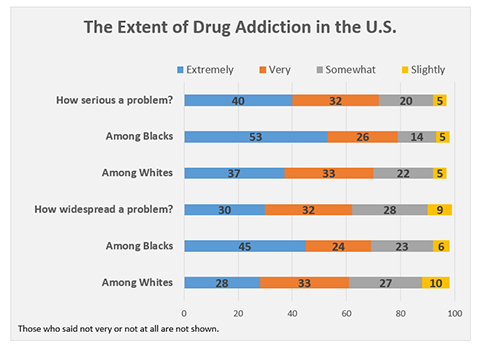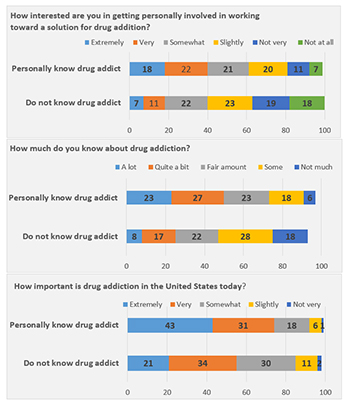The Problem of Drug Addiction in the United States
3/9/2016
More Americans now die every year from drug overdoses than they do in motor vehicle accidents, according to the Centers for Disease Control and Prevention. The rise of heroin-related deaths has been particularly sharp.
Nearly three-quarters of Americans consider drug addiction to be a serious problem in this country. Sixty percent of the public knows someone who has struggled with substance abuse, and 62 percent consider the problem to be widespread. Few Americans say drug addiction is being adequately addressed.
In an effort to combat the growing epidemic of prescription painkiller and heroin abuse, the Obama administration announced in February that it would ask Congress to spend an additional $1.1 billion next year to combat the growth by expanding treatment facilities, developing programs intended to prevent prescription drug overdoses, and cracking down on illegal sales.
The Fishlinger Center for Public Policy Research at the College of Mount Saint Vincent seeks to foster meaningful dialog on key public policy issues through independent, objective public opinion research. This initial survey focuses on social issues in the United States.
This is the sixth report from the survey; the earlier reports concentrated on human trafficking, the lack of affordable health care, root causes of poverty, domestic violence and the lack of educational opportunities. Additional reports on other social problems covered in the survey will be released in the coming months.
The poll was conducted online May 14 to 26, 2015 with 1,253 adults. Field work was conducted by IPSOS Public Affairs. Blacks, Hispanics, and Asians were sampled at a higher rate than their proportion of the population for reasons of analysis.
Importance of the Issue
According to the 2013 National Survey on Drug Use and Health, more than 9 percent of Americans ages 12 and over were illicit drug users. The percentage of drug users within white and black communities is roughly equivalent: 9.5 percent for whites and 10.5 percent for blacks.
Overall, 72 percent of the public considers drug addiction in the United States to be an extremely or very serious problem and 62 percent regard it as or very widespread. Blacks are more likely than whites to view drug addiction as extremely serious and extremely widespread.
72 percent of the public considers drug addiction in the United States to be an extremely or very serious problem and 62 percent regard it as or very widespread. Blacks are more likely than whites to view drug addiction as extremely serious and extremely widespread.
Personal Experience
Sixty percent of the public say they personally know someone who has experienced drug addiction. They are more likely to say they know a lot about the problem, more likely to consider it an important issue and more inclined to say they are interested in working toward a solution.
Causes of Drug Addiction
The public was asked if they thought drug addiction was the result more of individual choices or social factors. Most Americans said people are responsible themselves for their addiction—regardless of age, race, education, or experience with a substance user. While college graduates, adults under 30, and blacks are slightly more inclined to blame societal factors for substance abuse, still a majority of these groups agree that an individual’s choices is the cause of their problem.
The poll did not ask about genetics. According to the National Institute on Drug Abuse, a person’s risk for addiction is influenced by a combination of factors, including individual biology, their social environment, and their age.
Survey Methodology
The fieldwork for the Fishlinger Center poll was conducted by Ipsos Public Affairs. Online interviews with 1,253 adults were collected May 14 to 26, 2015. Sampling for the survey used a blended approach, combining the Ipsos iSay panel with Ampario sample (a blend of external panel and non-panel sources). Ipsos measures the precision of its online surveys using a credibility interval to measure sampling error. The survey of 1,253 respondents has a credibility interval of plus or minus 2.8 percentage points. The credibility interval may be larger for subgroups. The poll is subject to other potential sources of error, including, but not limited to coverage and measurement error. Data were weighted to match the national population on age, sex, Hispanic origin, and race. For purposes of analysis, black, Hispanic, and Asian respondents were oversampled. These groups were then weighted down to their proper proportion of the population.
About the Fishlinger Center for Public Policy
The Fishlinger Center for Public Policy Research opened in February 2015 at the College of Mount Saint Vincent. The Center, a member of the American Association for Public Opinion Research (AAPOR), conducts deep and broad studies of public opinion on key public policy concerns through independent and objective research conducted by students, faculty, and other members of the academic community.
By providing a forum for discourse that can stimulate intelligent dialog about issues that deeply affect all Americans, the Center illustrates and enhances the relationship between the work of the College and the common good.
About the College of Mount Saint Vincent
Founded in 1847 by the Sisters of Charity, the College of Mount Saint Vincent offers nationally recognized liberal arts education and a select array of professional fields of study on a landmark campus overlooking the Hudson River. Committed to the education of the whole person, and enriched by the unparalleled cultural, educational and career opportunities of New York City, the College equips students with the knowledge, skills and experiences necessary for lives of achievement, professional accomplishment and leadership in the 21st century.
